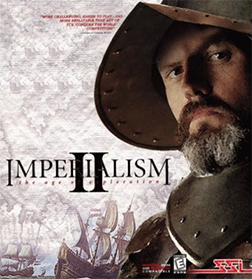
Freeciv is a single- and multiplayer turn-based strategy game for workstations and personal computers inspired by the proprietary Sid Meier's Civilization series. It is available for most desktop computer operating systems and available in an online browser version. Released under the GNU GPL-2.0-or-later, Freeciv is free and open source software. The game's default settings are closest to Civilization II, in both gameplay and graphics, including the units and the isometric grid. Freeciv is playable online at fciv.net and freecivweb.org

A play-by-mail game is a game played through postal mail, email or other digital media. Correspondence chess and Go were among the first PBM games. Diplomacy has been played by mail since 1963, introducing a multi-player aspect to PBM games. Flying Buffalo Inc. pioneered the first commercially available PBM game in 1970. A small number of PBM companies followed in the 1970s, with an explosion of hundreds of startup PBM companies in the 1980s at the peak of PBM gaming popularity, many of them small hobby companies—more than 90 percent of which eventually folded. A number of independent PBM magazines also started in the 1980s, including The Nuts & Bolts of PBM, Gaming Universal, Paper Mayhem and Flagship. These magazines eventually went out of print, replaced in the 21st century by the online PBM journal Suspense and Decision.

Master of Orion is a turn-based, 4X science fiction strategy game in which the player leads one of ten races to dominate the galaxy through a combination of diplomacy and conquest while developing technology, exploring and colonizing star systems.

Netrek is an Internet game for up to 16 players, written almost entirely in cross-platform open-source software. It combines features of multi-directional shooters and team-based real-time strategy games. Players attempt to disable or destroy their opponents' ships in real-time combat, while taking over enemy planets by bombing them and dropping off armies they pick up on friendly planets. The goal of the game is to capture all the opposing team's planets.
A multiplayer video game is a video game in which more than one person can play in the same game environment at the same time, either locally and on the same computing system, locally and on different computing systems via a local area network, or via a wide area network, most commonly the Internet. Multiplayer games usually require players to share a single game system or use networking technology to play together over a greater distance; players may compete against one or more human contestants, work cooperatively with a human partner to achieve a common goal, or supervise other players' activity. Due to multiplayer games allowing players to interact with other individuals, they provide an element of social communication absent from single-player games.

Stars! is a turn-based strategy, science fiction 4X game. Stars! was developed by Jeff Johnson and Jeff McBride for their own use, and initially released as shareware in 1995. A retail version was later produced for, and published by Empire Interactive, with developer Jason Gaston added to the team for QA, although the shareware version continued.
Atlantis is a free open-ended multi-player computer moderated fantasy turn-based strategy game for any number of players. It is played via email. The game world is populated by many races and monsters. Players may attempt to carve out huge empires, become master magicians, intrepid explorers, rich traders or any other career that comes to mind and interact with other players in trade, war and alliances. There is no declared winner of the game, players set their own objectives, and one can join at any time.

Age of Wonders is a 1999 turn-based strategy game co-developed by Triumph Studios and Epic MegaGames, and published by Gathering of Developers.

4X is a subgenre of strategy-based computer and board games, and include both turn-based and real-time strategy titles. The gameplay involves building an empire. Emphasis is placed upon economic and technological development, as well as a range of military and non-military routes to supremacy.

Spaceward Ho! is a turn-based science fiction computer strategy game that was written by Peter Commons, designed by Joe Williams (Joedelta) and published by Delta Tao Software. The first version was released in 1990, and further upgrades followed regularly; the current version, 5.0.5, was released on July 8, 2003. It has received wide recognition in the Macintosh community, for example being inducted into the Macworld Game Hall of Fame.
Starfire is a board wargame simulating space warfare and empire building in the 23rd century, created by Stephen V. Cole in 1979.

StarPeace is an open-ended online city-building computer game, in which thousands of players build and develop a large inhabitable world. Similar in many ways to SimCity 4, one major difference being StarPeace is fully online, and players compete against each other to build industrial, residential, retail markets, and more on a single planet, making sure to gain a steady income in which to fund their future expansion. Similar to other Sim games, there is no definite end. The planet continues to grow in a continuously evolving state as each player adds more buildings to it. Each player can choose between a large selection of planets on which to play.

Imperialism II: Age of Exploration is a turn-based strategy computer game developed by Frog City Software and published by Strategic Simulations, Inc. (SSI) in 1999. It is the successor to the 1997 game Imperialism. In Imperialism II, the player starts as ruler of a 16th-century European country, and must build an empire.

Space Quest III: The Pirates of Pestulon is a 1989 graphic adventure game by Sierra On-Line, and the third game in the Space Quest series.
The Star Fleet computer games are starship tactical combat simulations originally created by Dr. Trevor Sorensen in the late 1970s.
Civilization is a series of turn-based strategy video games, first released in 1991. Sid Meier developed the first game in the series and has had creative input for most of the rest, and his name is usually included in the formal title of these games, such as Sid Meier's Civilization. There are six main games in the series, a number of expansion packs and spin-off games, as well as board games inspired by the video game series. The series is considered a formative example of the 4X genre, in which players achieve victory through four routes: "eXplore, eXpand, eXploit, and eXterminate".

Thousand Parsec (TP) is a free and open source project with the goal of creating a framework for turn-based space empire building games.
Alan Emrich is best known as a writer about and designer of video games, who coined the term "4X", contributed to the design of Master of Orion and Master of Orion 3, and wrote strategy guides for video games. Before the rise of video games, Emrich wrote about and designed board games and organized conventions about them. He currently runs a small game publishing company and lectures in game design and project management. In 2001 Emrich received the Blomgren / Hamilton Memorial Award for Lifetime Achievement from ConsimWorld.COM.

Heroic Fantasy is a computer-moderated, dungeon crawl play-by-mail game. It has been active since 1982 when it was published by Flying Buffalo. The initial edition involved nine dungeon levels. Flying Buffalo published subsequent editions due to challenging gameplay initially, eventually limiting the game to four dungeon levels with a fifth outdoors level where players can assemble an army and capture one or more castles. The game is open-ended; gameplay continues until players decide to stop.

Quest is an open-end, fantasy, play-by-mail (PBM) role-playing game. Initially released in the United Kingdom in 1991, by Adventures by Mail, it later became available for play in the United States, Australia, and other countries in Europe. The game has a First and Second Age, initially comprising about twenty worlds of up to 1,000 parties controlled by players. After the year 2000, the worlds consolidated into four. The current publisher is KJC Games.













